
Toronto Women midfielder Jennifer Marion (right) and her girlfriend Meghan Solc at the Copley Road Soccer Complex in Akron, Ohio. Credit: Keph Senett
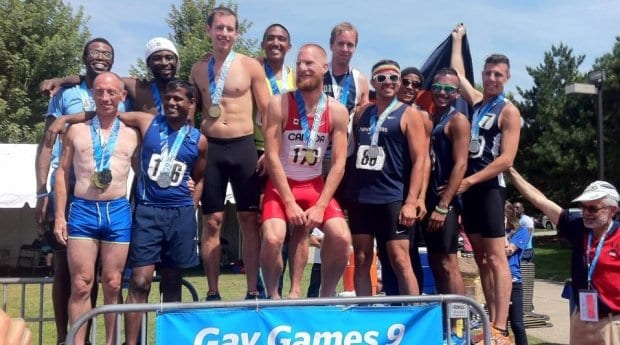
Gabe Gunnick Credit: Keph Senett
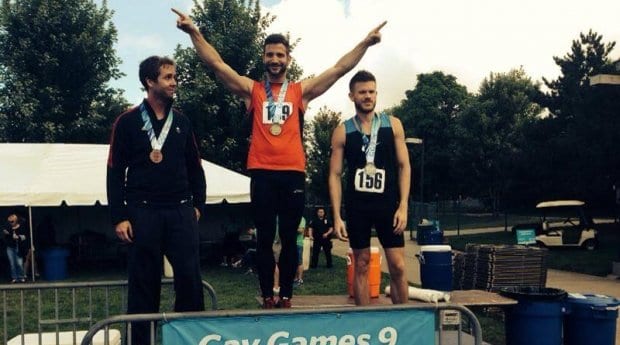
Germany, Australia and Canada on the podium for the high jump event. Credit: Giampiero Mancinelli
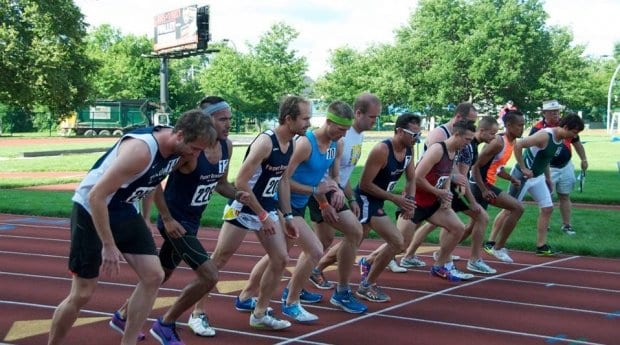
The group start of the 5,000 metres. Credit: Giampiero Mancinelli
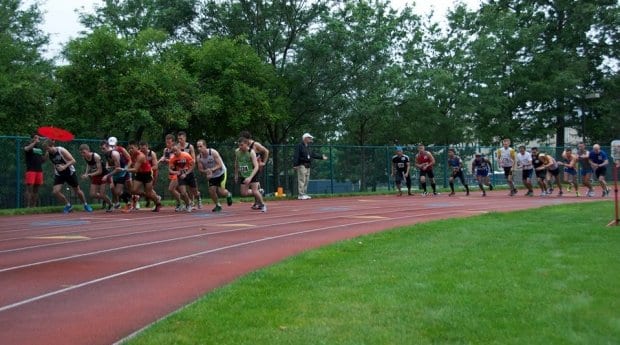
The 3,000-metre steeplechase start. Credit: Giampiero Mancinelli
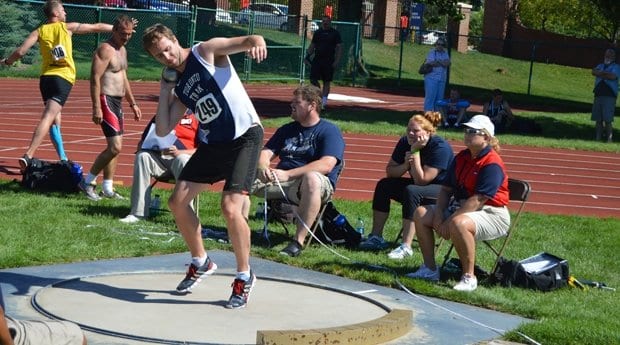
Credit: Kelly Murphy-Stevens
At the end of the 100-metre butterfly competition at Gay Games 9, Vancouver’s Shingo Kido, 28, walked away with a silver medal. His friend and swimming buddy from the LGBT (and allies) English Bay Swim Club, 35-year-old Brian Krenzer, earned two gold (200 individual medley and 100 fly) and two silver medals (100-metre back and 200-metre back). But even with five medals between them, the two are more excited about the experience than the hardware.
“Today and this week, we get to go to the Gay Games and compete against other gay athletes who share our stories and understand what we’ve been through,” Krenzer says. Originally an American citizen, he moved to Canada to be with his partner, a Syrian citizen. “I couldn’t sponsor him to stay in the United States. We had no choice but to find a country where we could be together, and Canada was one of the few in the world where we could go. We’ve been together [in Vancouver] for the last three and a half years. It’s wonderful — we love it.”
His days were made even better when his parents, two of his brothers and all of their children travelled from Upstate New York to watch him compete. “They’d never seen me swim before. They came with signs and banners with rainbows on them saying, ‘Go, Uncle Brian, you’re number one.’ It was amazing. It meant so much.”
When asked about his family, Kido says, “I do identify myself as being gay — I live a gay life — but I’m not out to my parents.” It’s been 11 years since he came out, and Kido acknowledges the need to speak honestly to his family. “At the age of 28, it’s still something I have to deal with.”
“That’s what’s so great about the Gay Games,” Krenzer says. “To be around other athletes who have suffered and struggled in the same way we have and have triumphed . . . to be around them and to celebrate. We’re athletes, and we love to compete and to know that we can still kick ass even though we’re gay.”
Both Krenzer and Kido are looking forward to getting back to their swim club and training for the next Gay Games, in Paris in 2018.
For the Toronto Women soccer team, the news that the women’s division in the sport had been cancelled because of low registration numbers came as a shock, but the team took it as a challenge. As other individual female registrants had been seeded across mixed teams, the squad was the sole women-only entrant in the competition. “We were told at the last minute, but playing against the [men’s and mixed teams] has actually been a good experience,” says Jennifer Marion, a 34-year-old centre midfielder. “It’s helped our team to improve. Every single game, we’ve been better.”
The competition, which included four days of matches, started out slow for the team with a series of hard losses, so the women agreed on a modest ambition: by the tournament’s end, they hoped to score a single goal. Their determination paid off. In one of the last games of the tournament, they put the ball in the net, securing a 1-0 victory over their opponents.
Although the win wasn’t enough to place Toronto Women in the finals, a women-only gold-medal match was arranged with the cooperation of Gay Games officials. The Toronto Women would play a team made up of all the other female players. With members from Canada, the United States, South Africa, the United Kingdom and Mexico, an aptly named Global FC team was formed. At the end of the second half, Toronto Women were gold-medal winners with a 5-1 victory.
The medals make an excellent souvenir, but for Marion and her girlfriend, Meghan Solc, the Gay Games are about much more. “In some ways, so often there is discrimination within sports for people who are LGBT,” says Solc, who is completing her residency in veterinary medicine in Akron, Ohio. “None of that exists on the field. It’s important to have a space where you can play.”
“The Gay Games is just a place to be who you are and to play,” Marion says. “There are so many amazing athletes here that have faced a lot of discrimination on and off the field. At the Games, none of the other stuff matters.”
Although the next Games are four years away, Marion and Solc are enthusiastic about participating. “Paris!” they shout, sparking a round of assent from the rest of the team.
Ottawa resident Scott Mullin, 32, almost didn’t make it to Gay Games 9. After his volleyball team decided not to compete and an administrative snafu left his track-and-field registration in limbo, Mullin sustained a hamstring injury. “At first, I took this as a sign that I shouldn’t go,” he says. “But after a day or so of thinking about it, I realized I was actually a lot more bummed out than I had expected.” Recalling the positive experiences he’d had at other international sporting events, he decided to make the trip. It ended up being a good choice for the first-time Gay Games attendee — by the end of the week, he had nine medals around his neck.
Mullin, who lives in Ottawa and is earning his master’s degree, found a healthy level of competition at the track in Akron but was just as impressed by the attitude of the athletes. “They would clap and cheer even if it meant that encouraging you would cost them a medal,” he says. “The more experienced athletes actually took the time to show [the inexperienced participants] proper techniques.” For Mullin, the friendly mentorship at the meet became as much a part of the experience as the competition. “Experienced athletes were tutoring beginners, and the beginners were improving exponentially from one attempt to the next. I suppose this was a type of passing of the torch,” he says.
By the end of the week, Mullin earned three gold (4×100-metre relay, 4×400-metre relay and javelin), four silver (4×200-metre relay, 400-metre, 400-metre hurdles and long jump) and two bronze medals (high jump and shot put). When asked about the best parts of his experience, he doesn’t mention his accolades: “Highlights for me included the excitement of seeing friends I hadn’t seen in years; watching a 99-year-old woman set the record for the fastest time in the 100-metre dash; seeing athletes learn and then excel in events they had never tried before; and seeing experienced athletes achieve personal goals.”

 Why you can trust Xtra
Why you can trust Xtra


